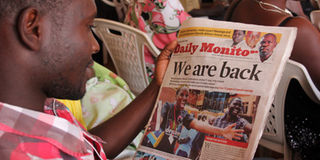In defence of media freedom, I say kudos to Monitor readers

A man reads a copy of the Daily Monitor in Kampala yesterday. Many activists showed solidarity with the Monitor Publications when the government shut the media house on May 20. PHOTO BY ABUBAKER LUBOWA.
Press freedom : “...Were it left to me to decide whether we should have a government without newspapers, or newspapers without a government, I should not hesitate a moment to prefer the latter…” Thomas Jefferson, third president of the United States (1801–1809).
Dear esteemed readers of the Parliament Watch, I am deeply sorry that I was not able to write last week because of the circumstances beyond my control. Police, on a black Monday of May 20, decided to invade Monitor Publications, closed the newspaper, two radio stations—KFM and Dembe FM, and asked all employees to go home and declared the premises a “crime scene”.
The ‘snoops’ at Red Pepper were not spared either. They were “smoked out” of their office in Namanve and ended up in the bush. To cut a long and perplexing story short, the police said they were looking for Gen David Sejusa’s letter the Daily Monitor published on May 7 and other unspecified documents.
In the brutality that followed the 11 days of closure, we saw strong-minded people— the Monitor readers and journalists protesting the media siege, all in defence of press freedom and freedom of speech.
At Monitor offices in Namuwongo; there were daily clashes between the police and jobless colleagues, readers, vendors and human rights activist who stood against the unnecessary closure of independent media houses.
The development partners, religious leaders, lawyers, members of Uganda Parliamentary Press Association (UPPA) among other sympathisers— all these made a lot of noise —condemning the Monitor siege.
In Parliament, friends of the independent media took the fight on the floor but were let down by Deputy Speaker Jacob Oulanyah who blocked a motion that sought to compel government to re-open the closed media houses and we thank you so much. Other sympathisers were also very busy following the developments on social media networks such as Facebook and Twitter, pleading with the government to respect media freedom.
Big thanks
We have endured days of redundancy, but you gave us hope, you stood by us “pakalast” and we thank you. To the journalists and human rights activists who were beaten in line of duty, we share your pain.
While I agree with our new Minister for Information and National Guidance, Ms Rose Namayanja, that press freedom is not absolute and that press freedom must not injure the national security or the rights of others, it’s also true that, independent media is essential for transparency and the attainment of equality and therefore, must be defended by all of us in public interest.
The good news is that Ms Namayanja has pledged a new beginning to ensure that there is a symbiotic relationship between the media and the government so as to put a stop to the attacks on newspapers.
Freedom of the press and other media are essential components of democracy. To this far, freedom of expression - in particular, freedom of the press - guarantees popular participation in the decisions and actions of government, and popular participation is the essence of our young democracy.
Therefore, it is the duty of the press to publish information that should be in the public domain, on what goes on in society, in government and in the opposition in order to uncover and disclose matters that ought to be subjected to public debate. There is a direct link between freedom of speech and vibrant democracy. I can say that democracy equals free media.
For instance, democratic elections are normally held in countries such as Azerbaijan, Pakistan, Nigeria, Russia and election observers call the elections “free and fair”, but the working situation for journalists is deteriorating day by day because of government censorship, begging the question: How democratic are they? In the new media relationship, one based on mutual interest and respect, before we closed newspapers and radio stations, it’s my desire that we consider freedom of the press as an indispensable tool of self-governance in the politics of our country.
Press freedom enables people to participate in government programmes, obtain information from a diversity of sources, make decisions, and communicate those decisions to the government. For instance, beyond the political purpose of free speech, the First Amendment to the American Constitution, the footing for press freedom, provides people with a “marketplace of ideas.”
Blame game
Regrettably, the most frequently cited cause of African problems is that the international media is biased against Africa even with stories about the invasion of newsrooms. But without press freedom, for us to begin complaining about negative coverage, we will be jumping the gun.
Like slave trade, the impact of colonisation as our excuse for failure to take off is also beginning to grow stale. What this means is that a possible antidote to all this finger-painting is to fix the grid-locks that impede our development as a country and in achieving all this, democracy and press freedom will be key. Our continued appeal to historical events to explain our inability to tolerate a free media is stalling transformation.




